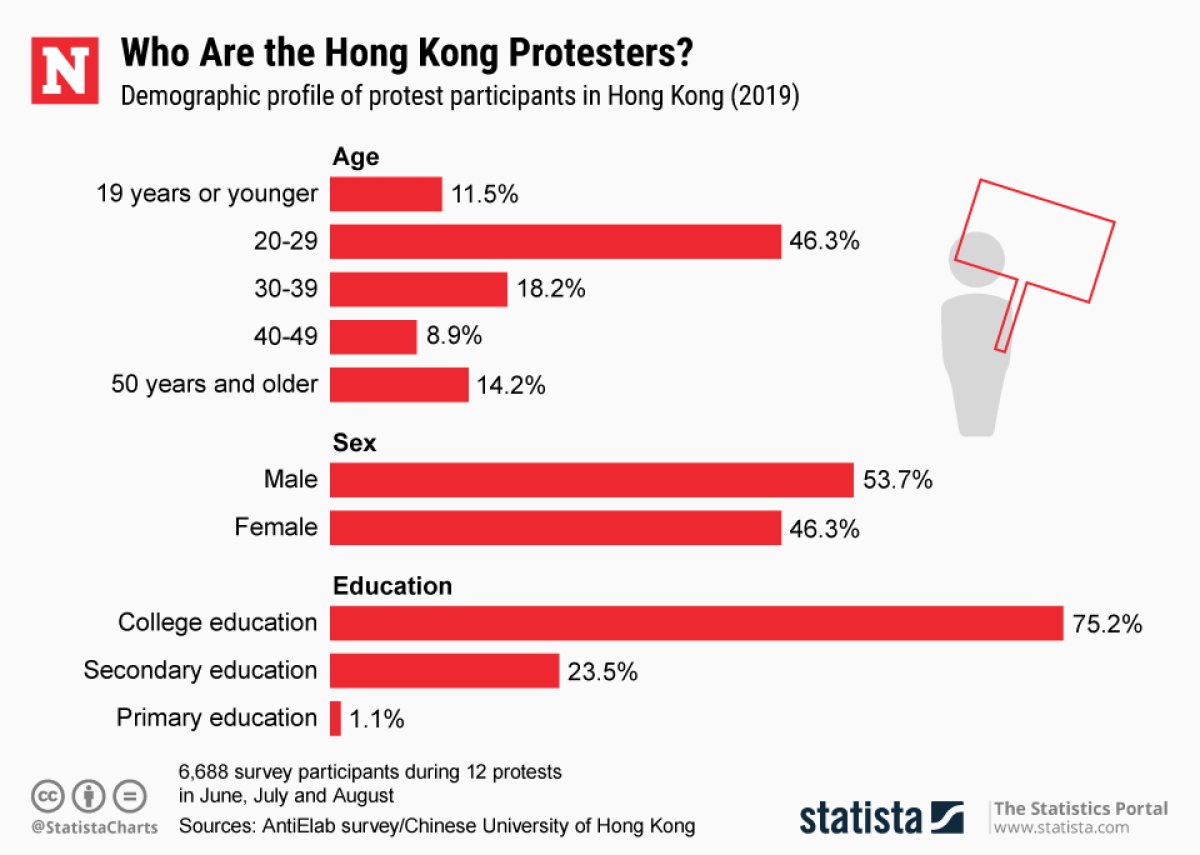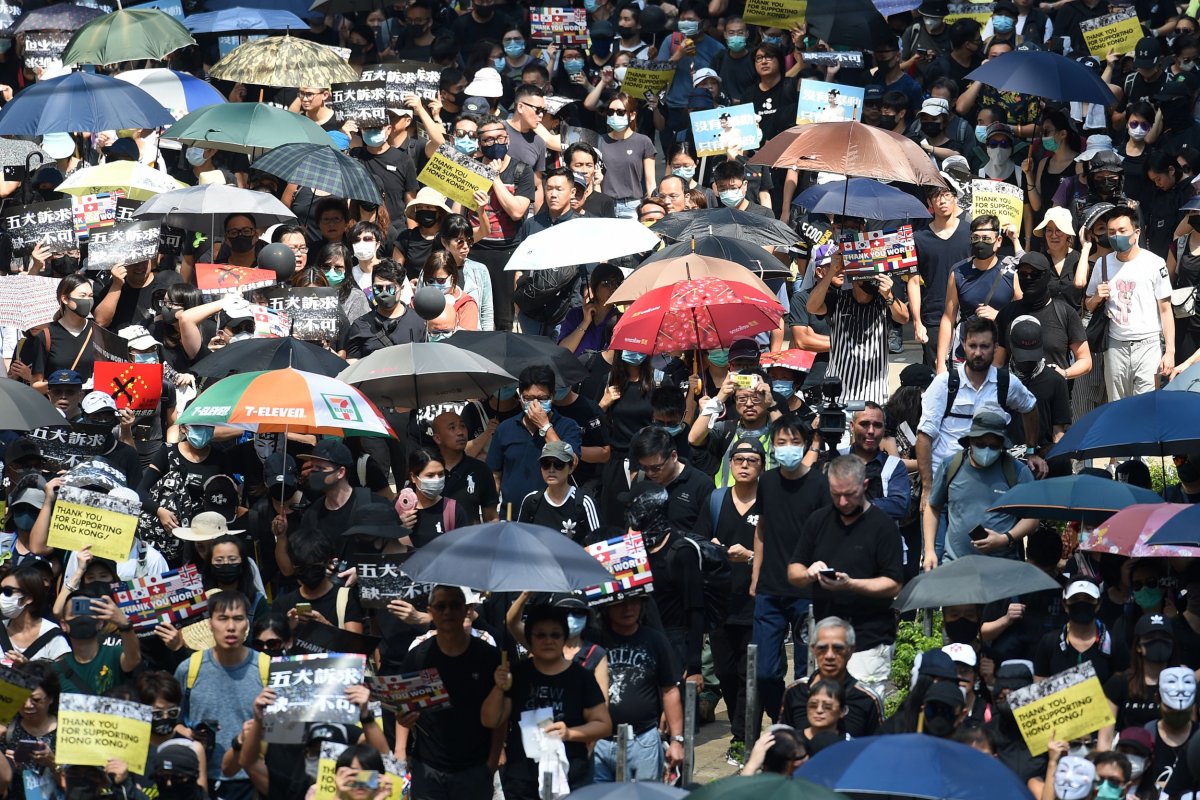Celebrations are taking place in cities, towns and villages all over China as citizens gather in a patriotic salute to the 70th birthday of the People's Republic.
But in Hong Kong—the ninth-largest city in China—the National Day of the People's Republic of China is a very different affair. The semi-autonomous region has been beset by anti-government protests since June, with millions taking to the streets in opposition to Beijing's encroaching political and legal influence.
The Hong Kong government has already canceled a planned fireworks show to mark the anniversary and moved the ceremony inside a convention center, rather than holding it outside and risking disruption.
Announcing the decision earlier this month, a statement from the Leisure and Cultural Services Department said the display was scrapped "in view of the latest situation and having regard to public safety."
Hong Kong's "summer of unrest" began in response to an extradition bill that would have allowed Hong Kong to extradite fugitives to face trial in China.
Opponents argued this would LET Beijing persecute political dissidents in Hong Kong, which since transitioning from British to Chinese rule in 1997 has existed in a "one country, two systems" balance with the mainland. This gives its residents greater freedoms than their compatriots.
Though Chief Executive Carrie Lam eventually withdrew the proposed extradition bill, the move was dismissed by protesters as too little, too late.
Activists are now demanding amnesty for the almost 1,500 people arrested, retraction of the term "rioters" to describe the activists, an independent inquiry into police violence, and universal suffrage for the territory. "Five demands, not one less," has become one of the most prominent rallying cries of the movement, which activists have christened the "revolution of our times."
This weekend, clashes between police and activists continued for the 17th consecutive week. The violent, yet now familiar, scenes served as a foreboding warning for Tuesday, with police prepared to meet opposition with force.
Superintendent John Tse told reporters Monday that the force was expecting "the situation tomorrow to be very, very dangerous." He added: "Core rioters are increasing their violence. The depth and breadth of their violence and plans show that they are increasingly resorting to terrorism."
Tse also claimed police had received intelligence that "hardcore violent protesters" are inciting others—including those with "suicide tendency"—to commit a wide range of violent acts. These allegedly included murdering police officers, disguising themselves as officers to kill civilians and setting fire to gas stations.
The graphic below, provided by Statista, illustrates the demographic profile of protesters in Hong Kong.

Regardless, activist groups are marching again, keen to spoil Beijing's big day. According to The Washington Post, tens of thousands of marchers are taking part in at least five different actions across the city. As of Tuesday morning, clashes with police have already been reported.
Protesters have regularly targeted potent symbols of Chinese national pride—for example, flags and state seals—and casting a shadow over the national day celebrations will enrage President Xi Jinping's government.
Jacques deLisle, a professor at the University of Pennsylvania Law School and an expert in Chinese law and politics, explained that protesters have focused on Tuesday's celebrations precisely to "inflict pain on Beijing" and as an "embarrassment to the regime."
"In Chinese politics, anniversaries are a big deal and this is an especially big deal anniversary when Xi wants to showcase his—and China's—power," deLisle continued. "The protestors already have seized upon other, lesser anniversaries—the July 1 anniversary of Hong Kong's reversion, the fifth anniversary of the umbrella movement—to up the pressure with large actions."
Perhaps that is why, according to Reuters, China has doubled the strength of its military garrison in Hong Kong. There are now between 10,000 and 12,000 troops stationed across the territory, after Beijing sent thousands across the border last month in what it described as a routine "rotation."
DeLisle warned that the authorities might take "especially strong measures to prevent or limit the protests" given the importance of Tuesday's anniversary.
"It's a case of a not-quite-irresistible force meeting what has proven to be less than an immovable object," deLisle explained.
If police are more willing to use violence, it could scare away some of the more steadfastly peaceful protesters, resulting in "an especially bad version of what we have seen lately, especially into the evenings—a confrontation between police especially primed or authorized to use force and some of the most radical, violent protesters," he said.
As activists have grown angrier, police have grown more violent. The vicious cycle has dragged on for nearly four months. Front line activists are now seasoned and some even armed, using slingshots, BB guns, various projectiles including petrol bombs and makeshift clubs to attack police.
Jonathan Ward, the author of "China's Vision of Victory" and the founder of the Atlas Organization consultancy in Washington D.C., told Newsweek that the government will spin any violence on Tuesday to play into its ongoing narrative of extremist activists backed by the U.S. and other Western powers.
It all "feeds back into their nationalist, nationalistic narrative of the great rejuvenation of the Chinese and the Chinese nation," Ward explained.
Given China's history of authoritarianism and repression, Ward warned he would not rule out mass violence on the part of the state. However, he noted that the global reach of the protesters can take some of the sting out of Beijing's tail.
"The protesters most important weapon, in some instances, is the iPhone and the being able to show the world what is going on," he explained. "Only sunlight and daylight on the actions of the Communist Party and the People's Republic of China can really create, I think, the deterrence to actually take worse actions."
The protesters are fighting against the odds. Past pro-democracy movements in Hong Kong have been crushed or allowed to wither and die. This summer's protests have been exceptional for the tenacity of the activists, but Beijing seems unlikely to budge on its long-term goal to absorb Hong Kong.
The successful introduction of the extradition bill, Ward said, would have been a step towards the "mass detention system, the torture system that the Communist Party is run for generations."
Those taking to the streets "know what that means," he said. "Anyone staring that in the face and realizing that could be their future, understands what it means."
It is this daunting reality that Ward argued makes the activists "the bravest young people in the world right now."

This article was updated to include an infographic.
Uncommon Knowledge
Newsweek is committed to challenging conventional wisdom and finding connections in the search for common ground.
Newsweek is committed to challenging conventional wisdom and finding connections in the search for common ground.
About the writer
David Brennan is Newsweek's Diplomatic Correspondent covering world politics and conflicts from London with a focus on NATO, the European ... Read more
To read how Newsweek uses AI as a newsroom tool, Click here.








